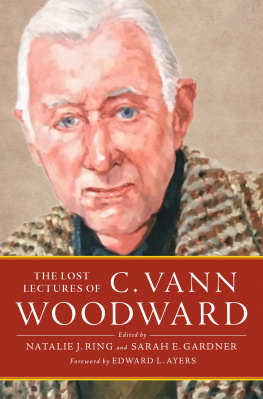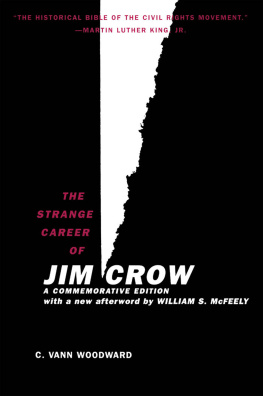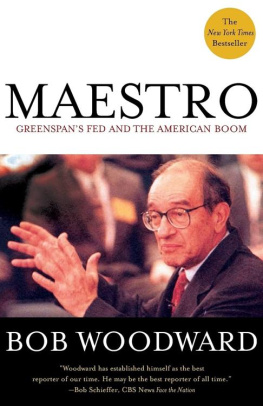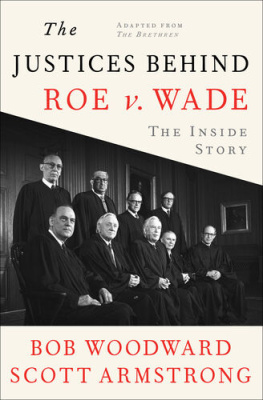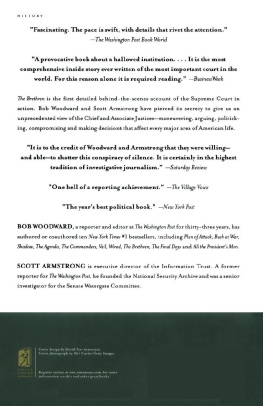The Lost Lectures of C. Vann Woodward

Oxford University Press is a department of the University of Oxford. It furthers the Universitys objective of excellence in research, scholarship, and education by publishing worldwide. Oxford is a registered trade mark of Oxford University Press in the UK and certain other countries.
Published in the United States of America by Oxford University Press
198 Madison Avenue, New York, NY 10016, United States of America.
Oxford University Press 2020
All rights reserved. No part of this publication may be reproduced, stored in a retrieval system, or transmitted, in any form or by any means, without the prior permission in writing of Oxford University Press, or as expressly permitted by law, by license, or under terms agreed with the appropriate reproduction rights organization. Inquiries concerning reproduction outside the scope of the above should be sent to the Rights Department, Oxford University Press, at the address above.
You must not circulate this work in any other form and you must impose this same condition on any acquirer.
Library of Congress Cataloging-in-Publication Data
Names: Woodward, C. Vann (Comer Vann), 19081999, author.
| Ring, Natalie J., editor. | Gardner, Sarah E., editor.
Title: The lost lectures of C. Vann Woodward / edited by Natalie J. Ring
and Sarah E. Gardner ; foreword by Edward L. Ayers.
Identifiers: LCCN 2020013093 (print) | LCCN 2020013094 (ebook) |
ISBN 9780190863951 (hardback) | ISBN 9780190863975 (epub) |
ISBN 9780190863968 (ebook)
Subjects: LCSH: DissentersSouthern StatesHistory. |
Reconstruction (U.S. history, 18651877) | Southern StatesHistory. |
LCGFT: Lectures.
Classification: LCC F209 .W625 2020 (print) |
LCC F209 (ebook) | DDC 973.8dc23
LC record available at https://lccn.loc.gov/2020013093
LC ebook record available at https://lccn.loc.gov/2020013094
Contents
Edward L. Ayers
c. vann woodward emerged as a leading American intellectual in the middle decades of the twentieth century. His remarkable series of important books between 1951 and 1955 attracted interest across the United States and beyond, supporting the struggle for civil rights in the South. As this fascinating collection shows, the very passion that drove Woodward to write history, his determination to foster a more just South, proved increasingly difficult for him as history changed around him.
The early 1950s witnessed profound events in the South. African Americans drove forward in their challenges to segregation, demanding equal schools, voting registration, fair treatment on public transportation, and equitable city services. Defenders of white supremacy railed and inflicted violence against the movement. White southerners who expressed good will toward individual black people remained silent or counseled caution.
As the South stirred, Woodward and other white southern liberals searched for the appropriate voice. Woodward had long opposed segregation and had left the South and the injustices the stifling environment those injustices bred. He had abandoned his native Arkansas in the early 1930s for Atlanta, and then New York, Chapel Hill, Gainesville, Charlottesville, and California. From 1946 through the 1950s Woodward occupied an outpost on the northern edge of the South, a professorship at Johns Hopkins University in Baltimore.
Woodwards magisterial book of 1951The Origins of the New Southwon him a new place of respect, stature, and stability. He enjoyed a broad network of friends and allies, white and black, in academe and beyond, in the South and beyond. Lecturing and writing widely, Woodward was admired and celebrated. Without a personal stake in any particular southern community, he spoke and wrote of the South with a detached vision and an ironic tone.
Invited to give the prestigious Walter Lynwood Fleming Lectures at Louisiana State University in 1951, Woodward chose the theme of southern dissenters. Those dissenters, from the era of slavery before the Civil War, displayed bravery but became outcasts. Living as exiles, they tried to move the South at a distance, using their writing and speaking to persuade fellow white southerners to abandon slavery and the sins and suffering slavery brought. They failed, purchasing only disdain and denunciation with their bravery.
Woodwards lively portraits of southern dissenters in the lectures radiated the strengths displayed in his other writing of the period: subtlety, complexity, and elegance of composition. But the portraits did not do the work Woodward himself most wanted them to do: offer useful examples for his current generation of southern dissenters. Woodward emphasized the eccentricity of the exiles and criticized their simplistic portrayal of the South as well as their personal unhappiness and failure. Woodward promised himself and his editors that he would turn the lectures into a book, but years passed and he never did. The press eventually stopped requesting them.
Instead, Woodward gave another set of lectures, at the University of Virginia in 1954, that became the basis of his most popular and influential book, The Strange Career of Jim Crow. Written under the stimulus of the Brown v. Board of Education decision of that year, Woodwards portrayal caught the wave of history. Emphasizing the contingent and recent origins of segregation, Woodward found himself with a controversial but profoundly important work of engaged history.
Buoyed by the reception of Strange Career, Woodward envisioned and embarked upon a full-dress history of the Reconstruction era. In the early 1960s, he visited southern archives to explore sources and signed two contracts for the book. In the meantime, he agreed to give the Messenger Lectures at Cornell University to work out some of his major themes.
As Woodward mapped out Reconstruction, however, history complicated his task. The civil rights era gave way to the bold declarations of the black power movement. The history of Reconstruction itself shifted abruptly. The contempt directed at the Radicals and the freedmen since the 1880s suddenly reversed. White and black Republicans who had been vilified and ridiculed in popular histories, novels, and films over three generations suddenly appeared as farsighted advocates of justice and equality. Former Confederates, routinely portrayed as heroic defenders of their homes, became ruthless and violent enemies of democracy.
Some of Woodwards own students and friends participated in the revision and he supported them. But he could not bring himself to agree with them. In Woodwards eyes, the Republicans of the North had been unsteady and insincere allies, ready to abandon their black partners at the first opportunity. Republican leaders spoke in lofty language about rights even as they pursued economic and political strategies that benefited their own region, their party, and themselves rather than the South they claimed to be liberating. They sustained segregation and disfranchisement in their northern states in fact if not in name. The Republicans demanded declarations of unbroken national loyalty they knew that almost no white southerners could honestly make.
Woodward did not celebrate the democratic potential of black southerners as the revisionists did. The freedpeople in his account seem lost, with no clear sense of purpose or identity. Woodwards emphasis on the physical suffering, hunger, and illness of the recently enslaved people fit poorly with the celebratory tone of the revisionists even though it foreshadowed recent accounts of the refugee camps in which tens of thousands of black people died. Woodward could not convert his skeptical vision into the interpretation his times seemed to demand.

